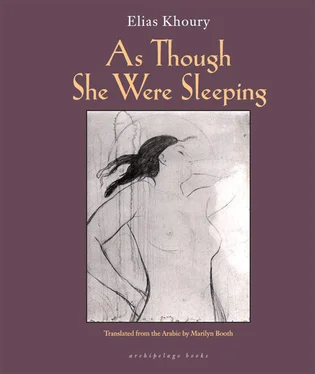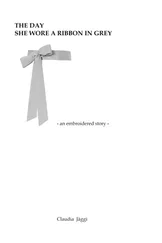Lashes line eyes holding nothing impure:
a beauty to cure all eyes forsaken
You are right, Milia, and I’m in the wrong. I have changed and you don’t bear any blame for that. But, look, we have walked a destined road, and what is destined to be, had to be where we strode . Let’s go back to the good old days. Where’s the laban immuh ? I am longing to have it — tomorrow, make me laban immuh ! We’ll have a glass and recite poetry like we used to do.
He put out his hand to feel for the baby in her belly and she jumped back. No — please, no, she said.
But I want to hear his voice with my hands, Mansour said.
Mansour did not understand her fear. Hearing her wail in the night that she wanted to go home, he promised to arrange to send her to Beirut. But she started, as if that frightened her even more, and said no. She did not want to go to Beirut. She had come to Nazareth to stay. And, she told him, she had begun to fear him because he was hearing her dreams, and when a person can listen to another’s dreams the listener can control the dreamer.
Since the death of his brother, their mother, Umm Amin, had become a different woman. Suddenly and without any advance warning she became terribly attached to Mansour. In him, she declared, she saw the image of his brother; she had never really paid attention to how alike they were; why, they were as alike as two tears from the same eye!
Is this exactly the way Umm Amin had put it? Most likely not, for this was Milia’s manner of speaking. In the morning, when Milia had just risen from sleep, her speech was soft and pliable. Speech was like dew, Milia told Mansour. Dew appears in the moment that connects nighttime to day; getting up, her mouth held the fresh aroma of this moment. He said he loved to kiss her in the morning because her lips tasted like fresh basil. When she spoke in the morning she used words that were sweet and fresh, words through which the breeze blew, words the like of which Mansour had never heard except in ancient Arabic poetry.
Why did Mansour mix up his mother’s speech with his wife’s? Was it because a man loves only one woman in his life — his mother — and then spends his entire life searching for her? Mansour was not any such man. He told Milia he despised his mother’s immoderate affection for his brother. He did not understand how the mother had been able to organize all of life to revolve around her, so that she was the pivot of the household and the engine behind the family business. Asma — Amin’s wife — was like a mere visitor in her own home. She could not do anything on her own, and if God had not made a woman’s breasts a fountain for the nourishment of children, then the woman would have found herself without anything to do at all.
With her beloved son dead, the older woman wandered aimlessly like a lost soul. The once-imperious eyes were broken and an uncharacteristic timidity came over her. The wife was another story, though. The woman who had kept to herself and had made her body and personality practically invisible, as if she were secluded from all eyes and veiled in bashfulness, became a new woman. The beauty of her black eyes was revealed and that beauty shone; and Lady Asma became the household’s presiding mistress. Between night and day roles were reversed. Mansour told Milia he had been taken completely unawares by Asma’s beauty. Where was all this loveliness hiding? he exclaimed. I mean, is it reasonable for a woman to become beautiful when her husband dies? They used to bury women with their husbands because a man’s death meant the end of her life, too. See how things have changed?
Now Mansour said to her firmly: I cannot leave my mother on her own.
So now it’s your love for your mother, is it? Fine, I don’t have anything to say about this and everything will happen just as you want. But I am afraid for you — and for my son, too. I mean, we don’t have to put ourselves in the paths of death as your brother did.
Where had Mansour found this new language? He stood in the kitchen and spoke of the Persian poet Abd el-Rahiim Mahmoud, and quoted a verse of his:
I will cradle my soul in the palm of my hand
Yet I’ll hurtle it down ruin’s dank pit below:
I will lead my own life to give my friends joy
or I’ll die me a death to curdle my foe
That isn’t poetry, Milia said. I mean, would you ever claim that this can compare to the verse of Mutanabbi?
Should you hazard an honor for which you yearn,
aim not for any less than the stars!
Death’s essence can be but one flavor, one fate
whether faced for ideals or mere scars
No, no — this one’s even finer — listen!
Knowing death meets the foot soldier, you stood your ground
As though ruin’s eyelid held you bound as it slept
Heroes tread past you though in wounded defeat
and your face is alight, your mouth smiles: you accept!
But I love these two lines:
A sole departure left us apart:
now death is a true leave-taking
Has this night not seen your eyes through my vision:
wasting to nothing in abject forsaking?
Now isn’t the time for love poetry, said Mansour. Listen again!
Think not of glory as wineskin and songstress:
it is naught but the sword that kills at first slash,
to strike off kings’ necks, and glory is to see
the black swirls of dust as the fierce soldiers clash
Bring me poetry like this! Bring me a poet like Mutanabbi, and then I’ll go anywhere! Then the taste of war becomes the tang of poetry, and poetry’s flavor is the deliciousness of love. But this fellow who carries his soul in his palm, well. .
He was a great poet, and it wasn’t enough for him to compose verse: he bore weapons into war and he died in glory and he named his son Tayyib so people would call him Abu’l-Tayyib, Father of the Good One — a father of goodness, if you like.
Martyrs are to be kept with reverence in our hearts, but a poet of this land has not yet been born. When his time comes all of you Palestinians will know immediately that this land has been created out of poetry. This land is not soil. This land is words kneaded patiently into stories, from the very time the Messiah walked on earth. The dirt here was a compost of letters and words. In the beginning was the Word, and the Word was God’s, and the Word was God . He was the word; and poetry is the ultimate word. Tomorrow, my love — well, after something like fifty years when this soil, our soil, gives birth to a great poet, you all — you Palestinians — will know that struggle yields victory only through the word, for it is stronger than weapons.
First, Milia, you are saying you all , why you ? Aren’t you part of this?
You’re right, my dear, I’m sorry. Yes, I have become us and when I talk about all of you I’m really speaking of all of us .
Secondly, I don’t think we can wait fifty years to see the poet you speak of appear — and I don’t think we need to wait. We have to fight with the poetry we know how to compose now, and with that poetry we’ll win the fight.
I don’t know about that, she said.
Thirdly, you know, you don’t know — whatever. All I know is that my brother died and I cannot leave my mother on her own.
Can you see yourself? Do you realize how like your mother you are, in the way your hands move and the twist of your mouth and the things you say? You yawn like her and you suck your lips when you are angry, just like her, and you stuff the pillow under your head when you sleep, even that’s like her, too. Ya Latif , God of grace, why have you changed like this!
Читать дальше












